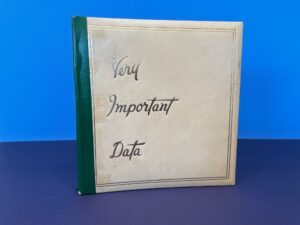By Karen Galatz

Many years back, I wanted to contact one of my cousins. I didn’t have her phone number and, for the life of me, I couldn’t recall her married name. I wasn’t worried because I knew the information was in my late mother’s address book. But I couldn’t find her telephone book — the familial Encyclopedia Britannica — and that was the end of that.
A few years later, I was traveling to Australia and wanted to call another cousin who lived there. Same problem. I didn’t know her number and still hadn’t located my mother’s phone book. And so, off I went to the land down under without visiting Cousin Sheryl.
And so it went for 20 years. I’d want to look up some random bit of family intel that could only be found in that irreplaceable compendium of all things Galatz, again to be thwarted by its absence. How had I misplaced such an important source of family history? How had I been so careless?
My children didn’t get what the big deal was. They couldn’t. Their information is all instantly accessible. It’s “in the cloud,” wherever or whatever that is. But we of an older generation remember phone books. Also, daily planners. For decades we dutifully carried them around in our pockets and pocketbooks.
We of that other generation didn’t delete information. We held on to it. At most, we might slash a giant X through a name after a lover’s quarrel. But for the most part, names and addresses remained in these small books we never threw out — a permanent record of someone, someplace, some time in our lives.
Periodically I scanned my bookshelves and rooted through closets and storage bins, searching for that precious little volume, only to come up empty-handed.
Then, one day, while sorting through a trunk of baby clothes and toys of my now-adult children, I found it. Why I placed it there I could not recall. My children’s items were all sweet smelling. The phone book? Not so much. My mother was a smoker. Still, the sight of her phone book filled me with joy and so much relief.

The gilt-edged book has an apt title — “Very Important Data.” It is, in fact, a veritable genealogist’s/sociologist’s Rosetta Stone, providing a detailed look at the life of an American housewife in the ’50s, ’60s, and ’70s.
It tells of retailers and businesses long gone — Abraham & Straus, the Fuller Brush salesman and the Oldsmobile dealership.
For a genealogist, it is a gold mine, listing the names of relatives long gone. It is shocking to realize how few people listed in that book are alive today. It fills me with nostalgia, sadness and awe for all those who passed in my lifetime.
My mother’s phone book calls to mind something else that is long gone, a kind of relentless female domesticity that few women today are interested in or have the time for.
The sleek 5-by-5-inch “book” is actually a notebook that snaps open and shut. In addition to the standard alphabetized tabs for names, addresses and phone numbers, it contains lists to track holiday cards (sent and received by year!), gifts, insurance records, family automobiles, membership in clubs (auto, fraternal, book and record), magazines subscriptions, and information on the U.S. government bonds you purchased.
It includes a handy “service index” to document the people who help keep your house and life running. Some of my favorites — chiropodist, fuel supplier and fruit store. Under “domestic help,” there’s spaces to list your butler and employment agency.
Meticulous housewives of the era could detail clothing sizes for her and him, preferred cosmetics and their guy’s go-to shaving lotion.
Today, this Rosetta Stone of the Galatz clan shows its age. The pages and ink are faded. The cover and binding are held together with green tape and its pages bound with those tiny hole reinforcement do-hikies.
Yet, for all the wear and tear, it’s thanks to this yellowed, still-smelling-of-cigarettes-and-perfume artifact that my mother comes to life for me. I picture her at her desk, talking on the phone to one of the relatives, me playing on the floor beside her.
In today’s alt-delete-obliterate paperless era, my children won’t have this kind of resource to recall our family or our times together. I guess I should tell them the passwords to my phone and computer — and point out where their grandmother’s phone book is located on the bookshelf.
*
You can read more of Karen’s work at Muddling through Middle Age or contact her at karen@muddling.me.